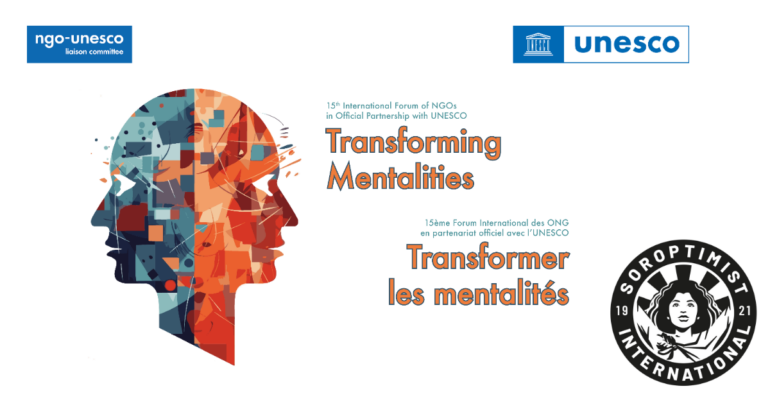Blog of Evelyne PARA, UN SI Representative at UNESCO
Don’t forget to watch Immediate Past President Maureen Maguire’s Intervention during this the 15th UNESCO International Forum for NGOs! See the full clip here!
——
The Fifth Sustainable Development Goal (SDG5) of the United Nations’ 2030 Agenda calls for Gender Equality, while the Tenth (SDG10) aims to achieve Reduced Inequalities. For these to be achieved, we must ensure the achievement of Quality Education, as named in SDG4, as well as the meaningful participation and commitment of all sections of our societies to genuine change and tackling multiple and intersecting forms of discrimination.
We know that meaningful change is achieved from the ground up. As such, our membership of 66,000 Soroptimists worldwide, as well as the broader organisational efforts of Soroptimist International (SI), has engaged in the field with local community leaders, policymakers and civil society in order to fight stereotypes – specifically, the multiple and intersecting forms of discrimination against women and girls, which so often prevent societies from fulfilling their potential.
Our efforts in this area are realised all over the world through the building of awareness, advocacy and financial action at local, national and international levels.

An International Forum to gather examples of good practice
The 15th International Forum of NGOs in Official Partnership with UNESCO was held on January 24 and 25 in Paris. Organised by the NGO-UNESCO Liaison Committee, in cooperation with UNESCO through its Social and Human Sciences Sector, this Forum gathered examples of good practice in challenging the stagnant inequalities within our societies in order to build concrete recommendations for action at the local level.

We were invited to testify about our actions and approaches to women’s empowerment, so we were delighted with the opportunity offered to Maureen Maguire to carry the voice of Soroptimist International alongside other NGO Presidents. In addition, it gave us the opportunity to broaden our network: to work with NGOs inside and outside the official network of UNESCO partners and to introduce new ideas, viewpoints, and expertise.
Soroptimist actions to empower women and girls

During the Forum, President Maureen explained that Soroptimist International recognises that education is one of the most effective strategies to empower women and girls and dramatically reduce gender inequality. It is a basic human right that should be safe, of high quality, and accessible to all.
Why? Because educating women and girls produces better health outcomes, fuels economic growth, and ensures stable and peaceful societies. By rethinking the learning process, what, how, when and where we learn, and by equipping societies with new skills, and mindsets, we can create the driving force we need to break through to a better world for all persons. Soroptimist International (SI) believes that education is a driver to overcome the social, cultural, economic, and political barriers that disproportionately impact women and girls in all their diversity.
Then, President Maureen presented the SI brochure produced for the Forum.
SI brochure on “Transforming Mentalities”
 The projects within this brochure provide an overview of the SI President’s Appeals and Club projects from 2011 to 2023 that have educated, enabled and empowered women and girls throughout the world to achieve their individual and collective potential, realise their aspirations and to have an equal voice in communities.
The projects within this brochure provide an overview of the SI President’s Appeals and Club projects from 2011 to 2023 that have educated, enabled and empowered women and girls throughout the world to achieve their individual and collective potential, realise their aspirations and to have an equal voice in communities.
Collectively, these creative and diverse projects demonstrate how Soroptimists have improved the lives of many thousands of women and girls, enabling them to take on leadership roles and make informed decisions for their own lives and that of their families.
Several examples of actions were presented to Forum participants:
>>> in Cambodia, where Soroptimists have supported over 2,800 women and girls. Working with newly widowed, headed households and girl students, training was provided to educate, empower, and enable them to increase their knowledge and professional life skills, so that they became leaders in their communities, as well as being financially independent.
>>> in Georgia, where Soroptimists have worked on a project that focused on empowering women and girls by improving their life skills and employability. Young women aged 16 – 29 engaged in on-line technology classes where they were trained not only in digital technology but also topics such leadership, active citizenship and how to gain employment. The knowledge and skills gained through these sessions have had a positive impact on the participants, improving their communication and leadership skills as well as gaining digital competencies.
>>> in Trinidad and Tobago, across three islands in the Caribbean, the objective was to position one hundred and twenty women and girls so that they could access the opportunities that existed in the digital economy in a safe and secure manner. The training equipped the participants with knowledge and skills to safeguard their personal information, online identities, and digital assets. A train-the-trainer model and the formation of a Tech Club has ensured the sustainability of the project.
>>> in Paraguay, Soroptimists are working with an educational institution for girls. Through education we will empower rural girls to overcome poverty, become entrepreneurs of environmental sustainability and active members of their community to improve their livelihoods. The project is providing sporting facilities together with learning workshops to improve the girls’ knowledge and skills to enable them to be the Agents of Change in their own communities.

To know more, discover the SI brochure here.
In conclusion, over the past 2 years, we have educated, empowered, and enabled over several thousand women and girls, to overcome barriers, to gain self-confidence and self-esteem and for them not only to be able to become positive role models for other, but to take their place in society and provide for their themselves and their families. Testimonies of Soroptimist were highly appreciated at the 15th UNESCO International Forum.

